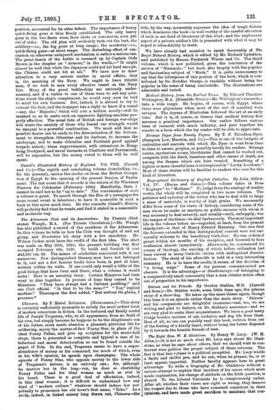soldiering, marry the matter-of-fact Fanny Star, in place of the
of the feeling of a kindly heart, without being the better disposed ideal Fanny Pallas, and give up sculpture for the music-hall by it towards the humble friends of man.
stage, there is presented as complete and typical a case of in- The Bight Hon. W. E. Gladstone. By Henry W. Lucy. (W. H. tellectual and moral deterioration as can be found outside the Allen.)—It is not so much what Mr. Lucy says about Mr. Glad- pages of Zola. In the end, Treganna seems to have a super- stone, as what he says about others, that we should wish to con- abundance of money at his command, too much of which, even trovert were politics the proper subject of these columns. The in his wife's opinion, he spends upon champagne. The whole episode of Fanny Star, who appeals merely to the lower side of Treganna's nature, is an unlovely one ; for, although he marries her in the long - run, he does so cherishing Fanny Pallas and his ideal woman as much as ever in his heart. There is a good deal of affectation, indeed, in this ideal woman ; it is difficult to understand how any kind of " modern culture" whatever should induce her per- petually to pronounce her old lover's first name, " Tcho." As a study, indeed, in linked misery long drawn out, Chirruera—the Chimwra. By F. Mabel Robinson. (Heinemann.)—This story as certainly sufficiently miserable to satisfy the most ardent lover of modern sensations in fiction. In the tortured and finally sordid life of Joseph Treganna, who, to all appearance, from no fault of his own, but simply because he happens to be the illegitimate son of his father, must needs abandon a pleasant, patrician life for
title, by the way, accurately expresses the idea of tragic failure which dominates the book—is well worthy of the careful attention of such as are fond of literature of this kind ; and the unpleasant aspect of a private soldier's life is presented with what it may be hoped is ultra-fidelity to truth.


































 Previous page
Previous page